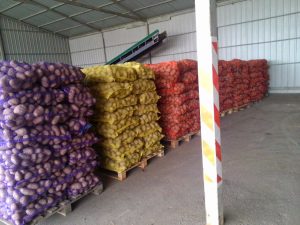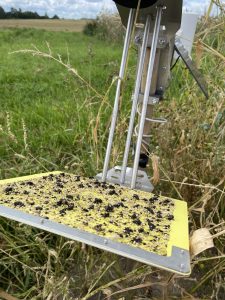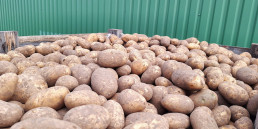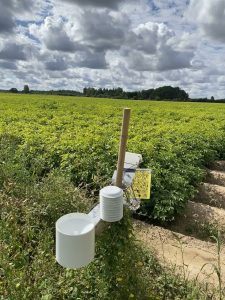Overview of the first stage (1–18 months)
Per pirmuosius aštuoniolika mėnesių STELLA projekto įgyvendinimo laikotarpio AgriFood Lithuania DIH (AFL) atliko pagrindinį darbą Lietuvoje – išbandė, kaip pažangios kenkėjų stebėsenos technologijos gali veikti realiomis ūkininkavimo sąlygomis. Šis etapas tapo tvirtu pagrindu tolesniam technologijų diegimui ir duomenų analizės tobulinimui, jungiant mokslinius tyrimus, skaitmeninius įrankius ir kasdienę žemės ūkio praktiką.
Bandomoji veikla buvo sutelkta pietų Lietuvoje, „Valuckų ūkyje“, viename stambiausių bulvių augintojų šalyje, kur kasmet bulvės auginamos apie 500 hektarų plote. AFL čia sukūrė duomenų rinkimo ir analizės infrastruktūrą, sujungiančią lauko stebėseną, meteorologinius duomenis ir vizualinius stebėjimus.
Technology in the soil – implementation of monitoring solutions
In the spring of 2024, AFL installed four automated insect traps to record pest population activity, and integrated weather stations measuring temperature, humidity, wind direction, and precipitation into two of them. In addition, 12 fields (2–19 ha) were monitored using satellite data to create an overall picture of field conditions and combine it with local measurements.
The results of the 2025 growing season revealed a clear pattern: aphid (Aphididae) activity began to manifest itself in the early stages of potato growth, but due to an unusually rainy and cool summer, the spread of potato leafroll virus (PLRV) was limited. This contrast between biological risk and meteorological conditions has become a valuable source for improving early warning methodologies and determining more accurate monitoring periods.
Farmer involvement and mutual benefits

The collaboration with Valuckų Farm became not only a technological project, but also a human one. The AFL team, together with the farm’s agronomists, addressed issues related to equipment installation, maintenance, and data transfer, periodically visited the fields, and discussed the initial results.
Such direct contact made it possible to assess how innovations work in the daily rhythm of farming – from pest detection to decisions on when to spray and when to wait. The farm provided valuable insights into the reliability of the equipment and its real impact on the planning of protection measures.
Knowledge dissemination and cooperation
AFL actively shared its experience and achievements at the national and international levels. The project was presented at the „Metų ūkis 2024“ event in Vilkaviškis, which was attended by over 100 farmers from the region, and at the international workshop „Pest Detection Tools feat. Lithuanian Pilot“ (June 2025), which brought together more than 50 experts in agricultural innovation.
Such events have become an important platform for discussions between scientists, farmers, and policymakers on how data analysis and smart technologies can become everyday farming tools.
Challenges and lessons learned

The first phase (M1–M18) showed that even the most advanced technologies depend on nature. The rainy summer of 2025 sometimes disrupted the operation of the equipment, so it was important to develop procedures for synchronizing data between satellite and local sources.
However, these challenges highlighted the main strength of the project: its ability to adapt quickly and learn from field data. The AFL team emphasized that farmers’ involvement and openness to innovation are just as important as the technology itself.
Next steps
In the coming period, AFL plans to expand the scope of monitoring and integrate additional data analysis tools that will enable even more accurate pest risk predictions. The link between science, technology, and agricultural practice will continue to be strengthened with the aim of making digital solutions a normal part of farming rather than an exception.
![]()




